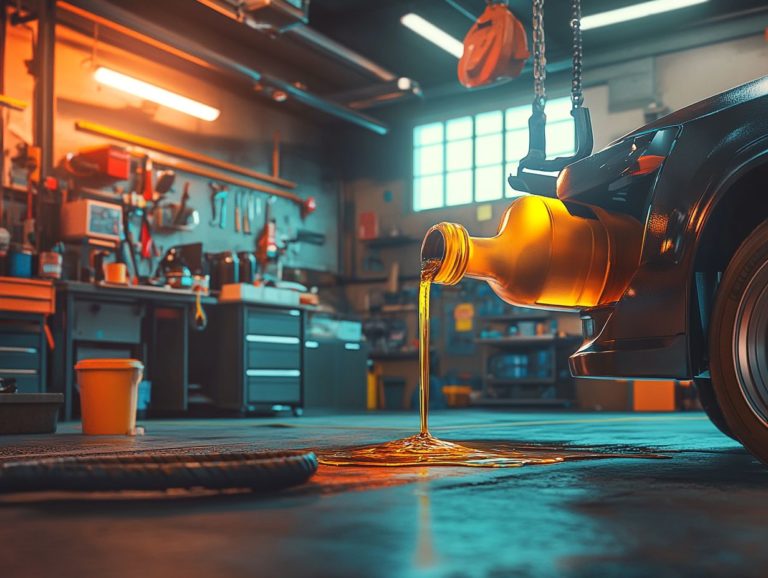Long-Term Maintenance Tips for Electric Cars
Electric cars are revolutionizing transportation, seamlessly blending sustainability with cutting-edge technology.
This article delves into the compelling benefits of owning an electric vehicle, including minimizing your environmental impact and enjoying substantial cost savings.
It also offers essential maintenance tips to keep your electric car in peak condition, enhancing its longevity and performance.
You ll also discover ways to make your electric car last longer, allowing you to savor the journey for years ahead.
Get ready to dive into the exciting world of electric vehicles!
Contents
- Key Takeaways:
- Benefits of Owning an Electric Car
- Long-Term Maintenance Tips for Electric Cars
- Maximizing the Lifespan of an Electric Car
- Frequently Asked Questions
- What are some important long-term maintenance tips for electric cars?
- How often should I replace the battery in my electric car?
- Do electric cars require different maintenance than traditional gasoline cars?
- Can I do any maintenance on my electric car myself?
- Are there any special precautions I should take when maintaining an electric car?
- What are some benefits of following a regular maintenance schedule for my electric car?
Key Takeaways:
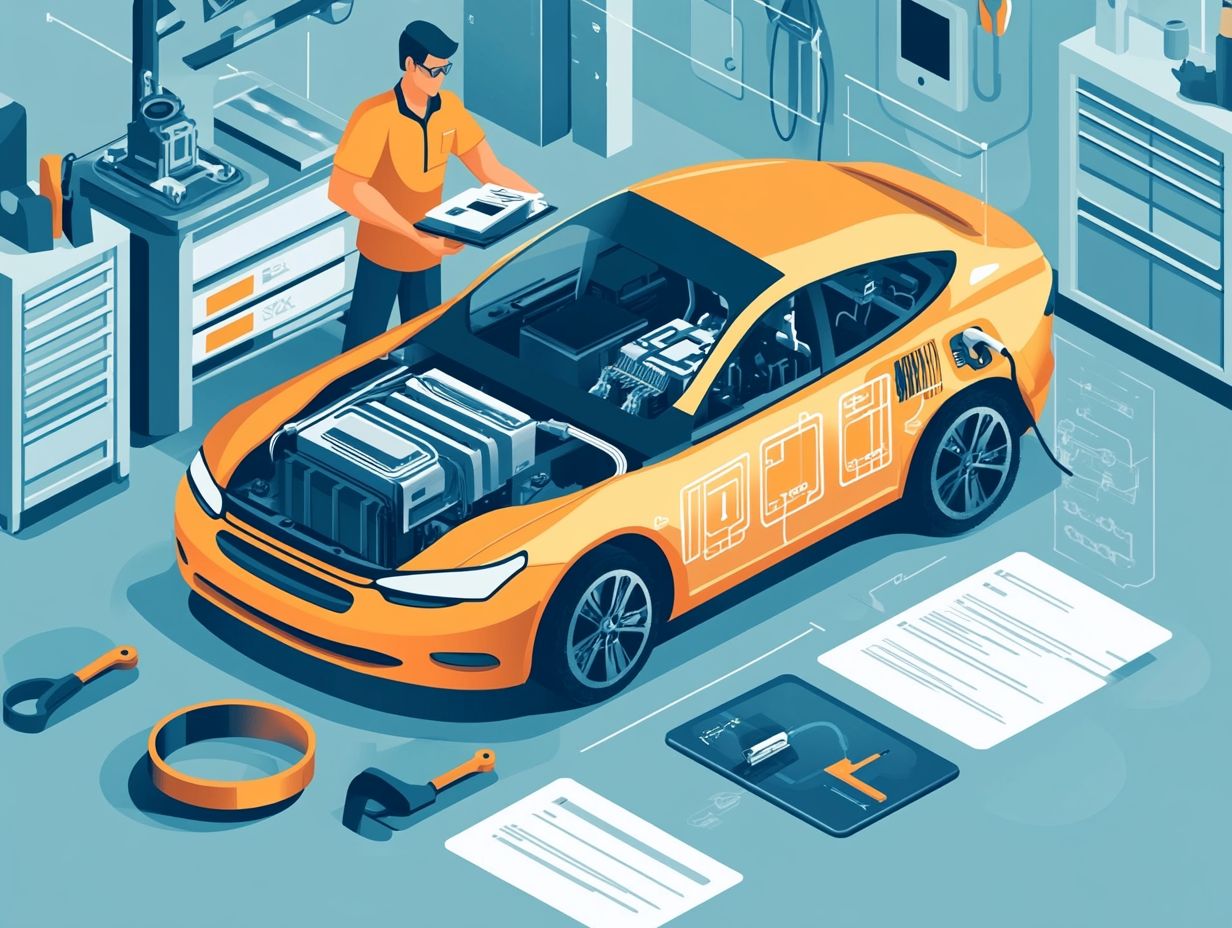
- Regular battery maintenance is essential for performance. Keep track of charging cycles and avoid extreme temperatures to prolong battery lifespan.
- Developing good charging habits, like avoiding frequent fast charges, can save money in the long run and extend your car’s range.
- Proper storage, usage, and regular maintenance checks are vital for maximizing your electric car’s lifespan. Upgrade or replace parts as needed for optimal performance.
What are Electric Cars?
Electric cars, or electric vehicles (EVs), are cars that run on electricity. They use electric motors instead of traditional combustion engines, making them an appealing choice for eco-conscious consumers. With their ability to reduce greenhouse gas emissions and lower lifetime maintenance costs compared to conventional vehicles think Nissan Leaf and Chevrolet Bolt you re investing in a sustainable future.
Advancements in battery technology and energy recovery systems mean electric cars are not just alternatives to traditional vehicles; they represent a marriage of sustainability and innovation. The key components of these vehicles include large batteries that store energy for propulsion and electric motors that transform this stored energy into motion.
Unlike traditional cars that rely on fossil fuels, electric vehicles allow you to recharge conveniently at home or through an extensive charging network. This provides the flexibility and convenience that modern driving demands. Plus, the reduced noise pollution and energy efficiency highlight their environmental benefits.
With continuous advancements in charging technology and a growing commitment to renewable energy sources, the future of electric driving is bright, paving the way for a cleaner, greener world that you can be part of.
Benefits of Owning an Electric Car
Owning an electric car presents a wealth of advantages. From significant savings on fuel and maintenance to a positive impact on the environment, electric vehicles (EVs) are rapidly emerging as the future of transportation.
According to Consumer Reports, the long-term savings associated with electric vehicles can far surpass the initial purchase price, making them a savvy investment for those who prioritize sustainability.
Environmental Impact
Electric vehicles (EVs) play a pivotal role in reducing greenhouse gas emissions and promoting sustainability. By opting for electric motors over internal combustion engines, you diminish your carbon footprint and contribute to cleaner air and a healthier environment.
The evolution of battery technology allows for seamless integration of renewable energy sources, like solar and wind, into your charging options. This synergy enhances the appeal of electric vehicles while helping transition away from fossil fuels.
As more individuals in your community embrace EVs, you collectively reduce dependence on non-renewable energy, demonstrating a shared commitment to environmental stewardship. The widespread adoption of these vehicles results in lower emissions not just carbon dioxide, but also other harmful pollutants greatly improving urban air quality and paving the way for a healthier future for generations to come.
Cost Savings
The cost savings associated with electric vehicles (EVs) can be impressive. You ll notice lower maintenance costs, reduced fuel expenses, and potential tax incentives.
With fewer mechanical parts, electric cars often prove to be a more economical choice than traditional gas vehicles.
As an EV owner, you ll enjoy significantly lower energy costs. These savings can add up quickly, especially with fluctuating gas prices.
Many regions offer substantial tax credits and rebates to encourage the switch to electric. Over time, fuel savings and lower maintenance expenses mean driving an electric vehicle can save you money.
Going electric isn t just good for the environment; it s a smart decision for your wallet!
Long-Term Maintenance Tips for Electric Cars
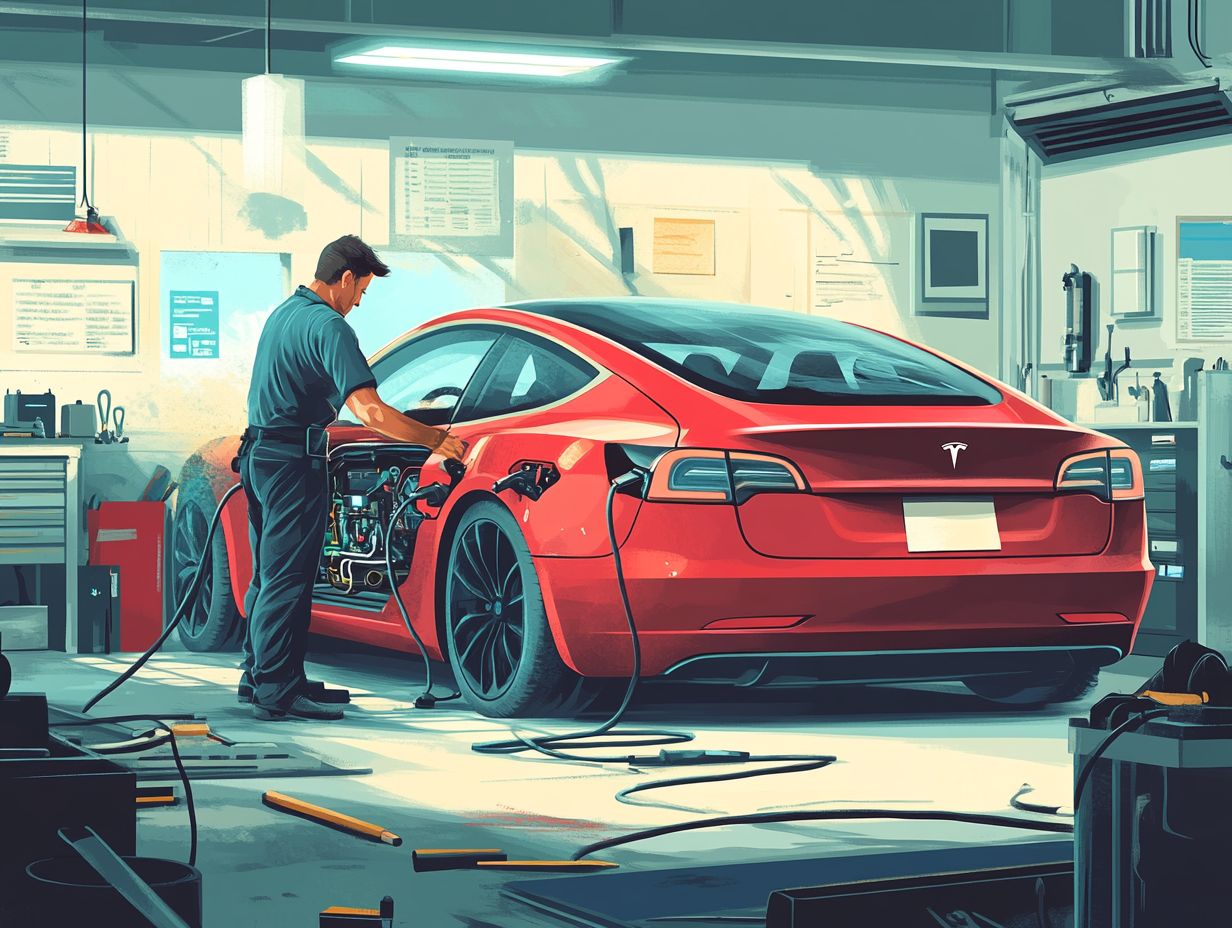
To guarantee the longevity and reliability of your electric car, it’s essential to adhere to a long-term maintenance schedule that caters specifically to its unique needs. Unlike conventional vehicles, electric cars come with distinct maintenance requirements—think battery care, regular mechanical inspections, and careful attention to the electrical system. For those with hybrid vehicles, consider following guidelines for routine maintenance for hybrid cars.
As an EV driver, staying informed about these best practices is important for good performance and peace of mind.
Battery Maintenance
Proper battery maintenance is essential for maximizing the lifespan of your battery in electric vehicles. By adopting specific charging habits such as steering clear of extreme discharges and regularly monitoring battery health you can ensure that your battery life remains optimal, significantly reducing the risk of premature battery replacement.
These practices, such as charging at a steady speed, ideally between 20% and 80%, can substantially enhance the longevity of your battery. If you’re storing your vehicle for extended periods, it s wise to keep the battery charged to about 50% and avoid exposing it to extreme temperatures, which can cause irreversible damage.
Engaging in regular maintenance checks, including software updates from manufacturers, further contributes to efficient battery operation and performance. These small, thoughtful adjustments not only save you money in the long run but also promote a sustainable approach to electric vehicle ownership.
Charging Habits
Adopting the right charging habits is essential for you as an electric vehicle (EV) owner to maintain battery health and ensure your car is always ready for the road. Understanding how to effectively utilize charging stations and establishing a routine can greatly enhance the longevity and performance of your electric vehicle.
By selecting charging stations specifically designed for your EV type and steering clear of public ones that may not be well-maintained, you can significantly safeguard your battery s lifespan. While fast charging can be convenient for those quick top-ups, it s wise to limit its use. Frequent exposure to high voltages can lead to thermal stress, which is something you definitely want to avoid.
Establishing a consistent daily charging routine such as plugging in after each drive during off-peak hours not only ensures that your vehicle is fully charged each morning but also optimizes your energy costs with time-based utility rates. Embracing these practices means you can enjoy your EV experience to the fullest, knowing you re taking great care of its battery health.
Regular Maintenance Checks
Regular maintenance checks are essential for ensuring your electric vehicle performs at its best. This includes checking parts and fluid checks. By scheduling these routine evaluations, you can catch potential issues early and avoid unexpected repairs that might lead to hefty maintenance bills.
Taking this proactive approach can really make a difference! It not only extends your vehicle’s lifespan but also boosts safety and efficiency. While electric vehicles have fewer moving parts compared to traditional combustion engines, they still require attention to key components like brakes, tires, and battery systems.
Monitoring fluid levels is crucial to ensure that cooling systems are working properly, which helps maintain battery performance. Neglecting these routine checks could lead to decreased effectiveness of these vital systems, ultimately impacting your overall driving experience and reliability.
Maximizing the Lifespan of an Electric Car
To maximize the lifespan of your electric car, you must adopt effective storage techniques and consider upgrading or replacing parts as necessary to maintain optimal performance.
By taking a proactive approach and understanding the intricacies of electric vehicle maintenance, you can extend the longevity of your investment while fully benefiting from warranty coverage.
Proper Storage and Usage
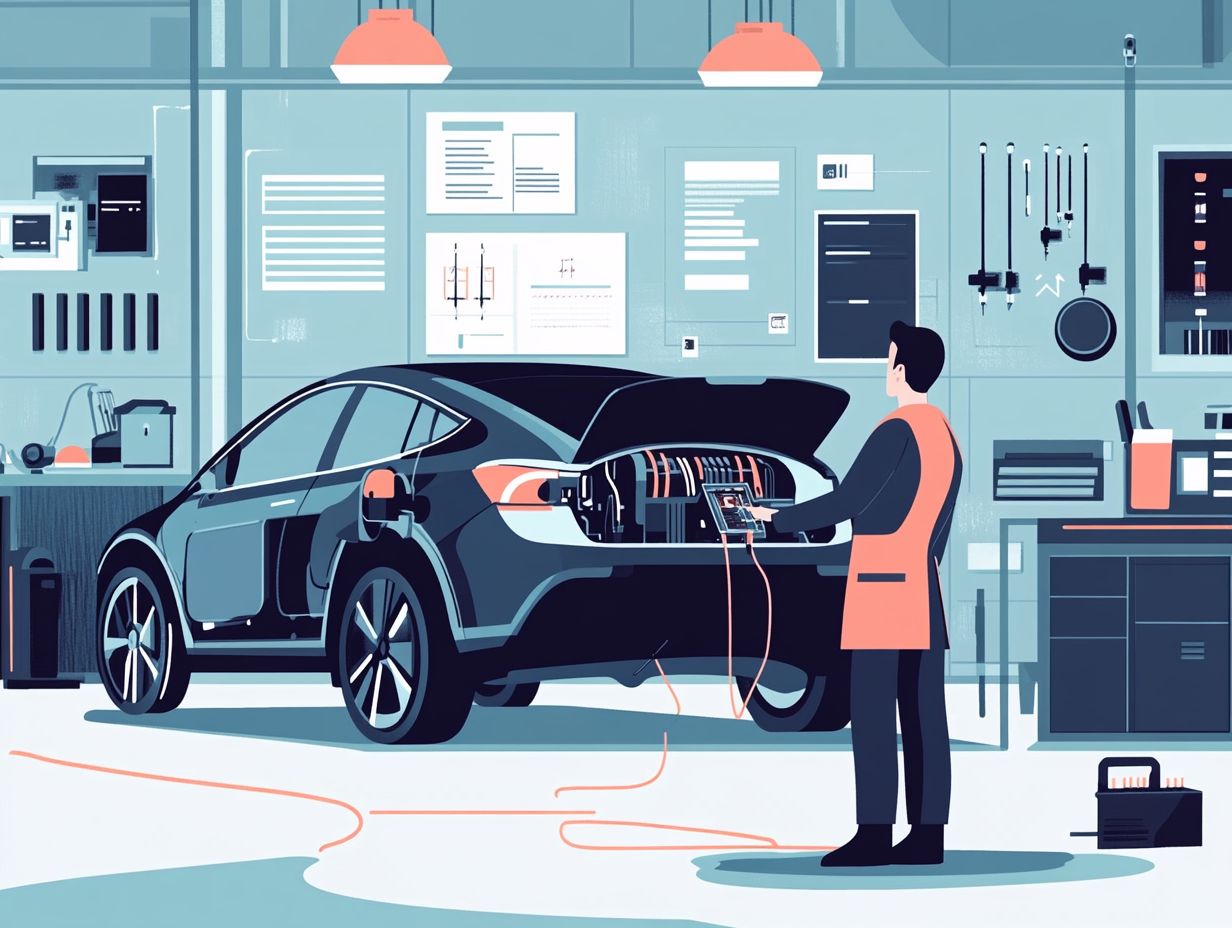
Proper storage and usage of your electric vehicle are crucial elements that directly influence battery life and the overall longevity of your car. By considering environmental factors like temperature and humidity, and adopting effective strategies for daily use, you can significantly enhance the efficiency and durability of your electric vehicle.
You must monitor your charging habits. Avoid both complete discharges and unnecessary rapid charges. For instance, keeping your battery charge between 20% and 80% can help prolong its health.
When parking, choose shaded areas or garages to shield your battery from extreme temperatures. This reduces stress on the system.
Your daily driving patterns can also be optimized! Incorporating regenerative braking, which helps recharge your battery while you drive, minimizes your reliance on charging points.
These best practices foster sustainable driving habits and positively impact your carbon footprint associated with electric car use.
Upgrading and Replacing Parts
Upgrading and replacing parts of your electric vehicle at the right intervals is essential for maintaining performance longevity and meeting safety standards. As an EV driver, being proactive in monitoring the condition of mechanical components, especially the battery pack, can save you from costly replacements and keep your vehicle’s warranty intact.
Beyond the battery, pay close attention to other vital components, such as the electric motor, charging system, and regenerative braking system. By understanding the typical lifespan and performance metrics of these parts, you can make informed decisions about necessary upgrades.
Regular inspections and diagnostics not only boost efficiency but also enhance overall driving safety. Keeping up with software improvements and firmware updates can optimize your vehicle s functionality, leading to a more satisfying driving experience and potentially increasing resale value.
Being aware of these factors ensures you get to enjoy your EV to the fullest. Schedule your maintenance checks today!
Final Thoughts and Recommendations
Electric vehicles mark a remarkable leap forward in automotive technology, presenting you with numerous advantages alongside unique maintenance considerations. Understanding your car’s maintenance needs is key to fully embracing the long-term cost savings and enduring performance that electric cars offer.
To maintain the best performance, it’s crucial for you to regularly check essential components like battery health, tire pressure, and braking systems.
Following manufacturer recommendations for software updates and routine inspections will enable you to identify potential issues early, ultimately preventing costly repairs down the line. Don t wait! Regular check-ups can prevent unexpected breakdowns.
Keeping your vehicle clean, both inside and out, not only boosts its aesthetic appeal but also shields it from corrosion and damage from environmental factors. Stay informed about charging stations to find the best ways to charge your vehicle, significantly enhancing your overall EV experience.
Frequently Asked Questions
What are some important long-term maintenance tips for electric cars?
Regularly check and replace the cabin air filter for optimal performance and air quality.
Keep an eye on the condition and level of your car’s coolant the fluid that helps keep your car s engine cool to prevent overheating.
Inspect and replace the battery every few years to ensure it is functioning properly.
Rotate and replace tires as needed to maintain traction and improve overall efficiency.
Regularly clean and maintain the charging port to prevent buildup and ensure a secure connection.
Schedule routine check-ups with a certified electric car mechanic to address any potential issues.
How often should I replace the battery in my electric car?
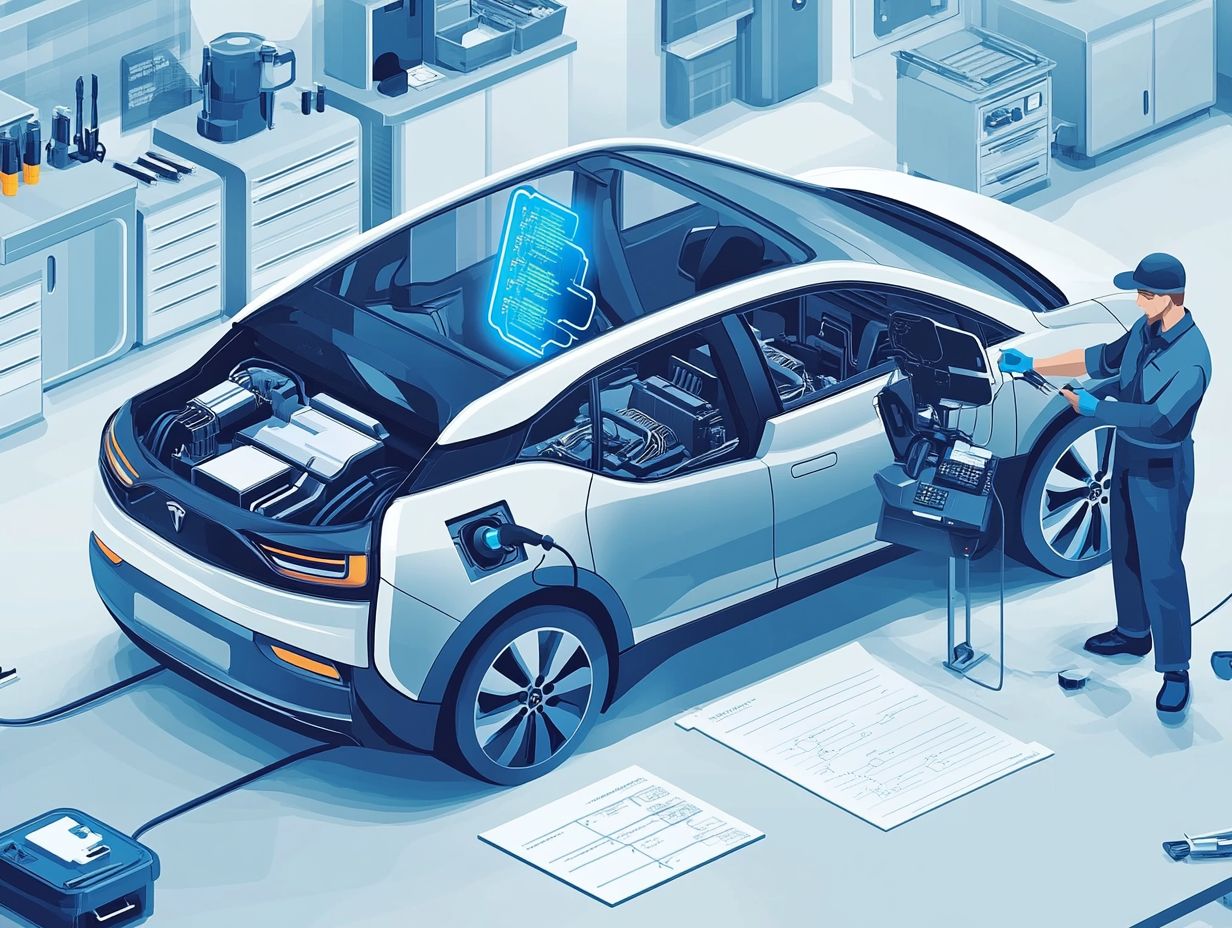
The frequency of battery replacement varies depending on the make and model of your electric car. Generally, it is recommended to replace the battery every 3-5 years.
Do electric cars require different maintenance than traditional gasoline cars?
Yes, electric cars have different maintenance needs due to their unique components, such as the battery and electric motor. However, the frequency of routine maintenance may be less compared to traditional cars.
Can I do any maintenance on my electric car myself?
While some basic maintenance tasks, such as checking the tire pressure and cleaning the charging port, can be done by the owner, it is recommended to have a certified electric car mechanic handle more complex maintenance tasks.
Are there any special precautions I should take when maintaining an electric car?
It is important to always follow the manufacturer’s guidelines for maintenance and to use specialized tools and equipment when handling electric car components. Also, ensure the car is turned off and unplugged before performing any maintenance tasks.
What are some benefits of following a regular maintenance schedule for my electric car?
Regular maintenance can extend the lifespan of your electric car and help prevent costly repairs in the future. It can also ensure optimal performance and efficiency, leading to potential savings on energy costs.






